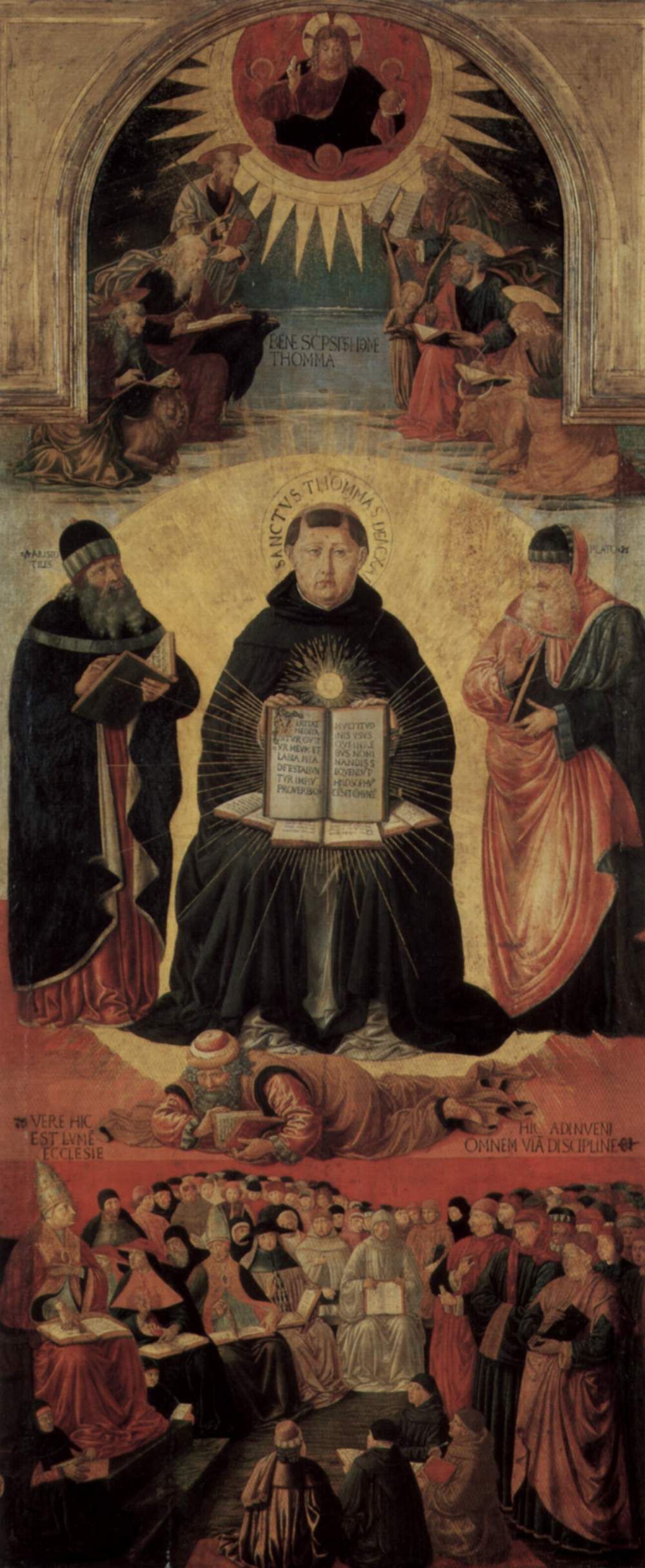
哲学专业的基督徒
Christianity and Platonism

The painting is Benozzo Gozzoli's Triumph of St. Thomas Aquinas, now in the Louvre. Above the picture is Jesus and the disciples, the monk in the middle is Aquinas, Aristotle and Plato are on his left and right. And lying below them is the Arab philosopher Averroy. The performance is that the Christian St. Thomas Aquinas defeated the Islamic Averroes with the help of Plato and Aristotle.
Why should pagans like Plato and Aristotle appear as positive figures in a Christian religious painting? This has to mention the historical origins of Christianity and Greek culture. Some people call the Western culture under the influence of Christianity the two Greek civilization, which was influenced by the Hebrew and Greek cultures. The Old Testament is written in Hebrew and the New Testament is written in Greek. It can be seen that the cultural tradition of Christianity is composed of these two main pillars. "Bible" Paul also specifically said: the Jews want miracles, the Greeks seek wisdom, (1 Corinthians 1:22 NIV) Christianity is exactly two types of Jews who want miracles and Greeks who seek wisdom. produced under the influence of culture.
The Greek philosophers are mentioned in the "Bible": there are also two scholars of Epicurean and Stoic who argued with him. Some said, "What is this nonsense talking about?" Some said, "He seems to be preaching about foreign ghosts and gods." This is because Paul preached about Jesus and the resurrection. (Acts 17:18 NU) According to our now more common translation, Piguro is Epicurus and Stoia is Stoic. The Apostle Paul preached the Gospel in Athens but was scorned by the Epicureans and Stoics. Because Epicureanism is atheistic, and the gods of the Stoics are not the same as the gods of the Abrahamic religions. Only the philosophy of Plato's department will have a great resonance with Christianity in the future.
Plato made a metaphor: a group of people are trapped in a cave, their hands and feet are tied, and they can only see the light and shadow of the cave wall in front of them, like a shadow play. Because this group of people have lived in this cave since childhood, they thought that these lights and shadows were the whole world. It happened that a person broke free and saw the world under the sun outside the cave, only to realize that the world of light and shadow he experienced was fake, and the world outside the cave was real. This cave metaphor can roughly represent the connotation of Platonism. Plato believed that there is an absolutely eternal, unchanging, and perfect world of ideas. Many objects in the world we live in are imperfect replicas of this world, as if real objects are projected under of light and shadow. And Plato believed that the highest idea is the idea of goodness, which is the existence that transcends everything.
In the 3rd century AD, Plotinus added elements of mysticism to Platonism and established Neoplatonism. Neoplatonists believe that Neoplatonism believes that the world has two poles, a divine light called "God" at one end and total darkness at the other. But Neoplatonism also believes that there is no complete darkness, only a lack of light. The only thing that exists in the world is God, shining the divine light, but just as the light gradually fades, the divine light cannot illuminate the whole world. Plotinus believed that the soul was illuminated by the divine light, and the matter was located in the dark world where it was not illuminated, while the "forms" of nature proposed by Plato were slightly illuminated by the divine light. This philosophical thought was soon absorbed and utilized by the early church fathers, and completely influenced the history of the church in the future. The most famous godfather, Augustine, mentioned that he used to read the Bible when he didn't study Plato's philosophy.
Christian teachings are easily combined with Platonist philosophy, both of which believe that the world we live in is not the real world, only the world beyond is the real world. Plato expressed the other side of the world as the world of ideas, and Christians expressed the other side of the world as the kingdom of God. That is, the world we live in is not all of us, we are only sojourners in it. If a person believes in the existence of absolute truth and goodness, he will resolutely take up the cross and go there. The ultimate good does not have reality as its destination, but God as its destination.
Like my work?
Don't forget to support or like, so I know you are with me..
Comment…